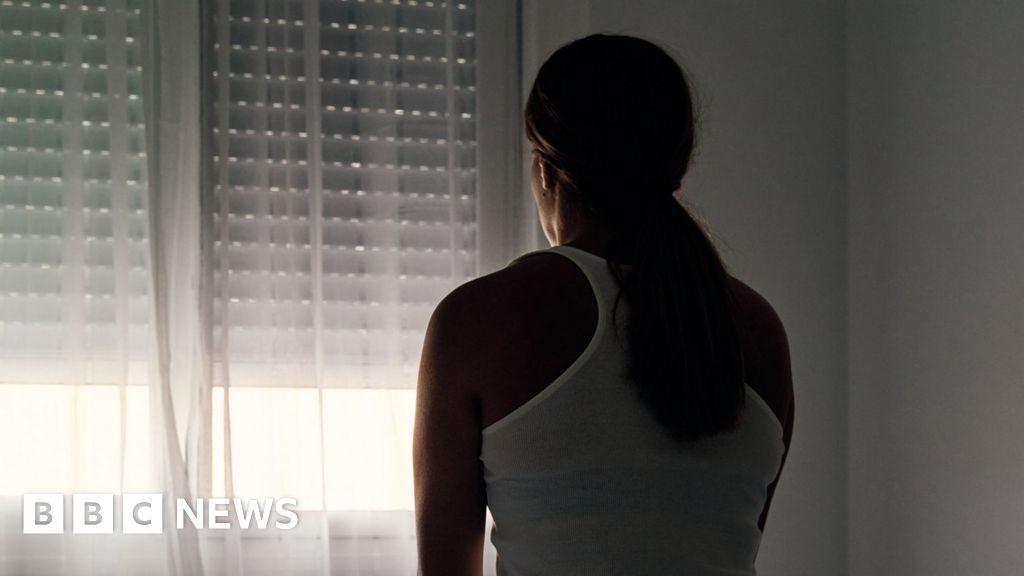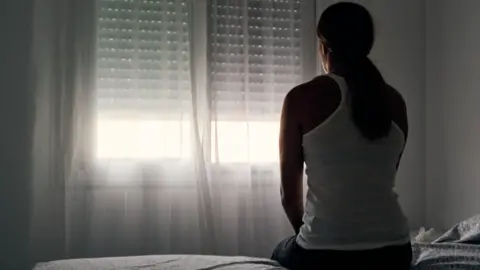 Alvaro Medina Jurado
Alvaro Medina JuradoWomen abused by former police officers say they feel the issue has been ignored by forces for decades.
One woman said she was “kicked and punched black and blue” by her ex-partner, who was a policeman at the time and other officers who witnessed it did not take any action.
The victims commissioner for England and Wales said she often hears of victims being “ignored or fobbed off” by police forces.
The Home Office said it was clear standards must urgently improve, and that the UK government has pledged to introduce mandatory professional standards on vetting and misconduct.
Mary – not her real name – told BBC Wales Live her ex partner formerly served as a police officer in Wales, and violently attacked and controlled her through their relationship over many years.
“I always thought police officers were there to uphold the law and be compassionate, but that wasn’t the case for me,” she said.
She said her partner punched her in her face, ripped her clothes and threw her into a wall in front of fellow officers at a social event when he was off duty.
“Nobody rang me after to ask if I was OK, and as far as I’m aware nothing was said to him. I felt totally abandoned,” Mary said.
She said she was too scared to report the behaviour, and that she felt no one would believe her word against a police officer.
Mary’s experience took place decades ago, however only now has she spoken out for the first time.
Earlier this year she wrote an anonymous testimony to the campaign group Police Me Too, which publishes stories of those who claim they have been abused by police officers.
“After the Sarah Everard case, I was so angry and shocked. I thought even after all these years even if it helps one person, I must speak up,” Mary said.
“I don’t think dreadful behaviour in the force has improved – look at some current high profile cases.”
The founder of the website Police Me Too said she is also a survivor of police misconduct.
Freya – not her real name – said hers and Mary’s experiences aren’t isolated. Since she created her website in 2021, she said he’s had 170 stories submitted – with at least 38 different named police forces.
Other women BBC Wales Live spoke to said behaviour like stalking and harassment wasn’t taken seriously, despite following complaint procedures and escalated cases to the Independent Office for Police Conduct (IOPC).
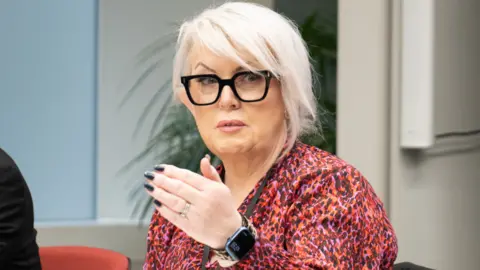 Baroness Newlove
Baroness NewloveThe victims commissioner for England and Wales, Baroness Helen Newlove, said it is “paramount that victims have confidence in the police” to investigate misconduct thoroughly and fairly.
She said a victim survey she carried out suggested that two in five victims were dissatisfied with police response and 73% lacked confidence that reporting a crime would lead to justice.
Home Office figures show there were 42,854 complaints against specific officers for the year ending March 2023.
In the same year only 972 – or 2% – of cases ended up in a formal process, like a hearing where a disciplinary or dismissal can be issued.
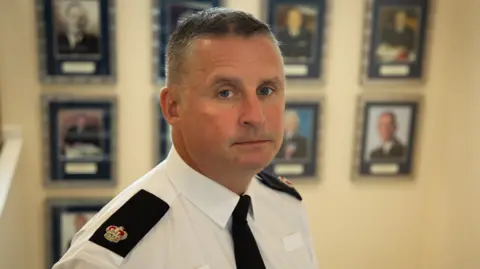
South Wales Police gave BBC Wales Live exclusive access to meet people in their teams at the forefront of the force tackling misconduct.
Earlier this year the force was one of only two graded as good – following an inspection of how it deals with corruption.
But just last year an officer with the force was jailed for having sex with a vulnerable victim of crime he met while on duty.
Det Supt Gareth Morgan, who heads the force’s professional standards department, said: “I believe it was the first conviction in the UK, [where] we proactively identified his behaviour, rather than wait for a complaint – which was the unique bit of this case.”
He said software which screens police systems like phones and emails showed “red flags” which meant officers started to build a case.
Software which runs 24/7recognises around 5,000 words and emojis which could be deemed as offensive or inappropriate.
“There’s certainly no way in South Wales Police we would try and protect people because they’re police officers,” he said.
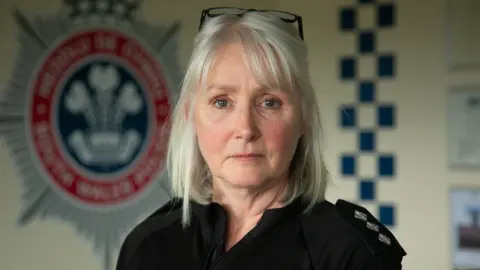
Det Ch Insp Donna Clutterbuck helped to create sexual harassment training – which has been rolled out in most forces across England and Wales.
“I just feel that I’ve got a duty [not just] as a police officer, but as a woman in policing to make sure that everyone is safe in the workplace.”
She said 49% of police staff questioned after a Unison report in 2018 said they had heard sexualised jokes being told repeatedly.
“As a result we held focus groups with people who had 28 years service and some who had less then two years service and the stories were still similar. It was still happening.”
The South Wales Police area served as the pilot for the training, and she said more than 102,000 police officers and staff nationally have now undertaken it.
“We’ve had an uplift in reporting [internally] which shows people know it’s going to be taken seriously and they will be believed,” she said.
A Home Office spokesperson said: “This government has pledged to introduce mandatory professional standards on vetting, checks, and misconduct for individual officers; and stronger training on violence against women and girls.”
The IOPC said: “We take the issue of police misconduct very seriously, in particular police perpetrated domestic abuse (PPDA). We are committed to supporting police forces to improve their handling of PPDA and enhance the trust and confidence of victim-survivors.”
If you are affected by any of the issues in this article you can find details of organisations that can help via the BBC Action Line.
